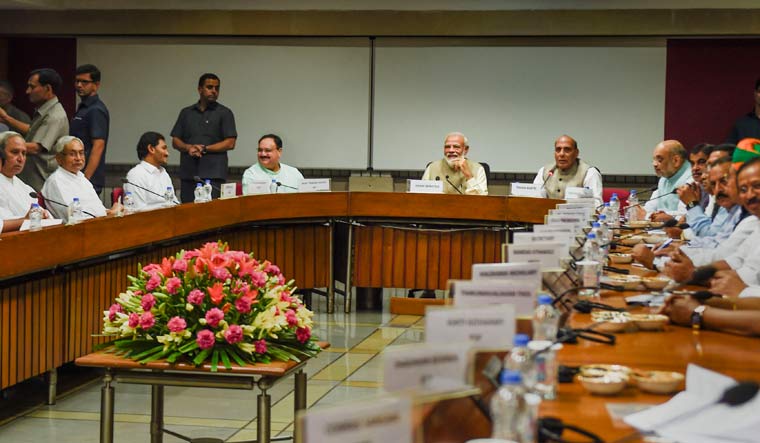Moving ahead with the idea of holding simultaneous elections in the country, the Narendra Modi government has decided to set up a panel for further consultations even as some of the opposition parties have expressed their apprehensions over the issue.
Out of the 40 political parties which were invited by the prime minister to discuss the issue on Wednesday, 21 parties participated in the meeting while three parties sent their opinion on the subject in writing.
During the meeting, the prime minister laid stress upon the need to hold simultaneous elections to Lok Sabha and state assemblies. He said a committee would be set up for wider consultations and to come up with suggestions in a time-bound manner. Modi noted that the issue of holding simultaneous elections was not a single party’s agenda, but it was an issue of national importance and the views of all parties would be considered and given due importance.
Also read
- ‘Everyone will regret it…’: PM Modi accuses opposition of spreading lies on electoral bonds
- What the fish! Tejashwi Yadav's meal on helicopter snowballs into major political controversy
- Congress’s poll manifesto bears ‘imprint of Muslim League’, says PM Modi
- ‘Important first step’: Congress on SC notice to Election Commission on counting VVPAT slips
Defence Minister Rajnath Singh conducted Wednesday's all-party meeting. Official sources said presidents of various parties appreciated the initiative of the prime minister to convene such a meeting and seek their views on these important matters.
Some of the opposition parties like the BJD and the YSR Congress supported the 'one nation, one poll' concept. However, several parties were of the view that all aspects of this proposal needed to be examined carefully.
Rajnath Singh later told media that most of the parties gave their support to 'one nation, one election' idea. He said the Left parties had a difference of opinion, still they had opposed not the idea, but just the implementation of it.
Many of the opposition leaders did not attend the meeting held at the Parliament House.
Among the absentees were Congress chief Rahul Gandhi, West Bengal CM Mamata Banerjee, BSP chief Mayawati, SP president Akhilesh Yadav, DMK's M.K. Stalin, Telangana CM K. Chandrashekhar Rao, Shiv Sena chief Uddhav Thackeray and Delhi CM Arvind Kejriwal.
CPI (M) general secretary Sitaram Yechury said that the concept of simultaneous elections is “fundamentally anti-federal and anti-democratic” which “strikes at the root of the parliamentary democratic system, as ordained in the Constitution.”
The CPI also said the 'one election' proposal looks good but is not practicable. “This goes against the spirit of federalism. Countries like Sweden, Belgium and South Africa have such 'one election' system. They are small. So small like some of the big districts of India. Uttar Pradesh population is equivalent to the combined population of Europe,” the CPI said in a statement.
Mayawati said she would have attended the meeting, had the issue been about the EVMs. She alleged that the issue of 'one election' was to divert attention from the real issues.
Among the leaders who attended the meeting were NCP leader Sharad Pawar, Bihar CM Nitish Kumar, Akali Dal chief Sukhbir Singh Badal, Odisha CM Naveen Patnaik, PDP leader Mehbooba Mufti and National Conference MP Farooq Abdullah.
The Aam Aadmi Party, which was represented by Raghav Chadda, said the government should first bring out a draft proposal or a white paper on the issue so that there would be a clarity. The Trinamool Congress also wanted a clear policy on the issue to debate it.
The issue of simultaneous elections is likely to generate enough political heat in the coming days as the government will now set up a committee and then come out with a report.
Wednesday's all-party meeting was called to also discuss other issues like celebration of 150 years of Mahatma Gandhi's birth anniversary, increasing the productivity of the Parliament and an agenda for new India.
The AAP raised concerns over keeping the state assemblies or Lok Sabha in suspended animation in case of loss of majority or otherwise, terming the practice as anti-democratic.
Meanwhile, referring to one of the suggestions in the NITI Aayog paper that if the dissolution of the Lok Sabha cannot be avoided, then a provision can be made for the President to carry out the administration of the country, Yechury said this is an outrageous proposal aimed at executing Presidency through back door.
On the issue of increasing the productivity of the Parliament, various party chiefs expressed their concern over the frequent adjournments and disruptions. They said that an atmosphere of discussion and dialogue must prevail in the House, as disruptions rob the members of the opportunity to express their views on the issues of the day. Participants in the meeting also expressed hope that since approximately half of the members of the 17th Lok Sabha are first time MPs (267), they would take this opportunity to carry forward the spirit of constructive dialogue in the House. PM Modi, too, called for increasing the productivity of the Parliament through meaningful discussions.
On the issue of the development of Aspirational Districts, Modi said all the state governments must work in coordination with the Centre to bring the most backward districts in their states at par with the best performing districts. This way the goal of a ‘New India’ would be achieved by 2022, he added.



